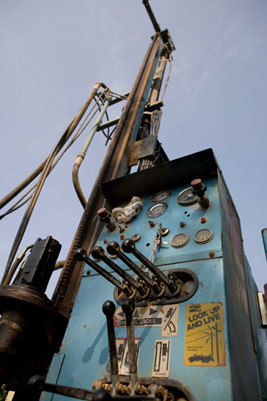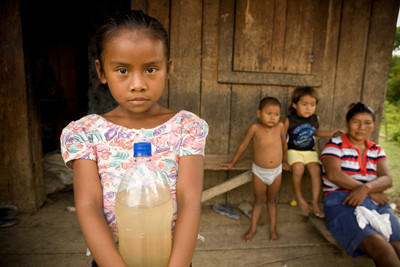How to be a Savvy Investor in Water + Gospel

When it comes to powerful impact, it’s hard to beat investing in water—it can dramatically improve quality of life, strengthen the local church, and help people experience the gospel. But not all giving opportunities in clean water are created equal, and where you give matters. More importantly, as a donor you can have influence beyond your dollar. Effective work in clean water involves more than engineering, and by asking a few key questions you can not only ensure that your investment has the impact you want it to have but may also help the organizations you support grow in healthy ways. What are some of the characteristics you should look for, why does the cost of water projects vary so much, and how does water development done by Christian organizations differ from secular ones?
How to be a Savvy Investor in Water and the Gospel
We are thirteen years into the 21st century and 780 million people still lack access to improved water sources. It is important to ensure that communities plan and manage their own solutions to this problem, but strategic efforts by thoughtful development agencies can play a critical role of support and empowerment. I recently identified more than 55 clean water organizations with an explicit Christian identity, and there are doubtless many more. For the conscientious Christ-centered donor, clean water represents an outstanding opportunity to make a real difference in the lives of the poor, both physically and spiritually. Consider the following:
- Approximately 2,000 children die each day from diarrhea alone. Clean water can bring substantial improvements in health by reducing water related diseases such as diarrhea, schistosomiasis, Guinea worm, trachoma and river blindness. The health impact is greatly enhanced when water is combined with improved hygiene and sanitation.
- Women and children spend 200 million hours per day fetching water, often risking physical attack along the way. Each year 443 million school days are lost by children who miss school to fetch water or from water related illness. Clean water can significantly improve quality of life and productivity for millions of women and children.
- Water can also serve as a tool to empower the poor by giving them the skills and confidence to identify problems and feasible solutions, identify and raise necessary resources, hold elected representatives accountable and lead and take ownership of the process of navigating their way out of poverty.
- Most importantly, the gift of clean water is an opportunity to communicate the love of Jesus and open the door for long term outreach by the local church.
A dollar invested in clean water can yield three to five dollars in benefits, and more than $20 in some places. That’s a 300% to 500% return on your investment.
Doing it Well
Not all clean water organizations are created equal. It can be daunting for donors to look past the marketing messages of all the organizations competing for their hearts and dollars. Donors want to give with confidence but due diligence is difficult when the organization is working in remote locations around the world. The sad truth is that one third or more of clean water projects fail prematurely, some in the first few months, and many are never repaired. Even when clean water is provided to the community, it is only a partial solution. How people transport and store their water, where they defecate, and whether they wash their hands determines whether they capture the health benefits of clean water. Failure to influence these behaviors can lead to very little improvement in health. Even worse, wells given in a welfare or hand-out mode can lead to a sense of entitlement. Broken and abandoned wells can be a constant reminder of people’s helplessness and dependency on outsiders. Do we want the gospel to be associated with this? Of course not!
 The challenge of clean water is not primarily an engineering problem. Rather, it is a relationship problem. Most water organizations have mastered the task of installing a well or piped water system, but even the best systems will require maintenance and repair. It takes someone’s time and energy to operate and maintain water pumps, pipes and taps, and it costs money to repair them. It is naive to think a community will automatically be able to undertake these functions if it hasn’t done so in the past. The community must decide who is responsible for these functions, who will pay for water and how much, who will collect the money, who will use it responsibly, and what will happen if the designated individuals don’t live up to expectations. These critical decisions require motivation and relationships of trust and respect within the community that can’t be created and developed in a jiffy. These relationships are worth the investment because they will determine the long-term success of the clean water project. These are the same relationships necessary for a community to work together for a school, clinic, a bridge, a road or whatever else they believe will improve their lives. Indeed, these relationships are the building blocks for the steps out of poverty, and the best clean water organizations take the time to invest in them.
The challenge of clean water is not primarily an engineering problem. Rather, it is a relationship problem. Most water organizations have mastered the task of installing a well or piped water system, but even the best systems will require maintenance and repair. It takes someone’s time and energy to operate and maintain water pumps, pipes and taps, and it costs money to repair them. It is naive to think a community will automatically be able to undertake these functions if it hasn’t done so in the past. The community must decide who is responsible for these functions, who will pay for water and how much, who will collect the money, who will use it responsibly, and what will happen if the designated individuals don’t live up to expectations. These critical decisions require motivation and relationships of trust and respect within the community that can’t be created and developed in a jiffy. These relationships are worth the investment because they will determine the long-term success of the clean water project. These are the same relationships necessary for a community to work together for a school, clinic, a bridge, a road or whatever else they believe will improve their lives. Indeed, these relationships are the building blocks for the steps out of poverty, and the best clean water organizations take the time to invest in them.
So how can a non-expert identify an effective clean water organization? There are several practices that stand out among the best organizations. These include:
- Giving a balanced perspective on their web site, acknowledging the challenges as well as the opportunities associated with helping the poor gain access to clean water.
- Inviting scrutiny by identifying their local partners and listing coordinates of their wells on their web site.
- Requiring significant investment by the local community, often including cash, as part of a long-term relationship. They are prepared to walk away where commitment is low.
- Investing heavily to ensure long-term operations, maintenance, and repair.
- Combining clean water with hygiene and sanitation to maximize health impact.
- Using water as a means of building broader community capacity to solve problems and tap local and external resources.
- Coordinating with and sometimes leveraging resources from local government as part of a regional strategy.
- Evaluating the long-term impact of their work in order to improve.
“Cost per well” is not a meaningful way to compare the work of organizations. Hardware and drilling costs vary enormously from region to region and larger systems that serve more people cost more than smaller ones. An organization can also lower their average cost per well by choosing easy locations or skimping on important elements of sustainability and impact. Generally, organizations that follow the practices listed above are good value for money even if they cost a bit more. If you are concerned about costs, ask the organization for a breakdown of what a donation for clean water pays for.
Christian Identity
 Clean water is not only an opportunity to improve people’s health and productivity, it can also be a very effective means of showing the love of Christ, strengthening the local church, and sharing the gospel message. By partnering with a local church, a clean water intervention can offer a tangible means by which a local church can bless the community, raising the status of the body of Christ and strengthening its ministry. Where there is no church, clean water can open doors in communities that are otherwise closed to the gospel. The long term engagement that effective clean water work requires can lead to the relationships of trust and respect out of which opportunities to share the gospel emerge very naturally. Water and gospel can fit together very effectively.
Clean water is not only an opportunity to improve people’s health and productivity, it can also be a very effective means of showing the love of Christ, strengthening the local church, and sharing the gospel message. By partnering with a local church, a clean water intervention can offer a tangible means by which a local church can bless the community, raising the status of the body of Christ and strengthening its ministry. Where there is no church, clean water can open doors in communities that are otherwise closed to the gospel. The long term engagement that effective clean water work requires can lead to the relationships of trust and respect out of which opportunities to share the gospel emerge very naturally. Water and gospel can fit together very effectively.
I have found that what is Christian about Christian clean water organizations varies tremendously and usually falls into several categories:
- Biblically motivated – these organizations are motivated by passages such as Isaiah 41:17-18 “When the poor and needy seek water, I will open rivers on the bare heights, and fountains in the midst of the valleys; I will make the wilderness a pool of water, and the dry land springs of water” or Matthew 25:35 “I was thirsty and you gave me something to drink.” But they do not call attention to their Christian identity among the people they serve.
- Christian identity only – these organizations are content to be known as Christian among the communities they serve, often stating that their service is motivated by their Christian faith and trusting that their love will be a witness, but they generally refrain from overt proclamation.
- Water with a bit of the gospel – the main function of these organizations is the provision of clean water, but they may invite a pastor to pray at a dedication or show the Jesus film as part of the process.
- Water primarily as a means to present the gospel – these organizations use water to gain access to a community primarily as a means of sharing the gospel. The long-term operation and health benefit is less of a priority for them.
- Water and the gospel intertwined with equal emphasis – these organizations give similar levels of importance to meeting both physical and spiritual needs of the communities they serve, viewing the two as inseparable.
If these things are important to you, you need to ask what their Christian identity looks like in the field.
Influence Beyond Your Dollar
God has blessed you with the privilege of participating in his work with your gifts, and taking this privilege seriously is part of being a good steward of the resources God has entrusted to you. Your giving should be treated like your investments, a serious activity that is thoughtful and intentional. Moreover, as a donor your influence extends beyond your dollar. Non-profits pay a lot of attention to donors and you can discover a lot about them by asking a few key questions. Here are three questions I suggest:
- How do you partner with communities and what do they have to contribute to the project? Look for higher levels of contribution, including putting cash into a repair fund.
- What percentage of your wells is still functioning after two years, and what steps are you taking to measure this? This is not an easy question to answer, but good water organizations are curious about effectiveness of their work and work hard to assess it.
- How does your Christian identity manifest itself in your work? There is no “right” answer, but if an organization is serious about their Christian identity they will have given this question considerable thought. Is Christian merely an adjective they use or is the gospel integrated in the project cycle?
Even if an organization is not able to answer these questions, asking these questions communicates that these issues are important to you and that you are well-informed. These questions empower you as a donor to influence the industry. If even a few givers raise these issues, these questions will be given priority, which will in the long run have more influence than the dollars you give.
Clean water represents a remarkable opportunity for you to participate in dramatically improving the lives of the poor while also invensting in eternity.









comments